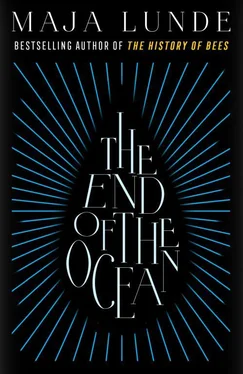Her hand was cool, but it burned against my skin.
I moaned again.
Everything hurt, all my movements, even the faint summer breeze, even the air itself.
And her hand, when it was on my arm like that, it was almost unbearable.
“Don’t take it away,” I said.
And she left it where it was.
All the sails are set and the wind drives me forward, at five knots for the third day in a row, soon it will be six knots, the boat maintains maximum speed. The northern wind has again shifted slightly to the east, but still permits me to set sail for the south and the power is back on, everything on board is functioning as it should.
I am in constant movement, a feeling of a restlessness inhabiting my body. I yawn abruptly and involuntarily, my jaw creaks, I fill my lungs, am so tired, really very tired, have lost count of the number of days without consecutive hours of sleep and, with no relief in sight now, I am approaching the English Channel. The vessel traffic is increasing, so lying down and trusting that it will suffice to check the fairway every half-hour won’t do here. I must live in the cockpit now.
I have showered. There is still a lot of water in the tank, my hair in the salty sea air smells of shampoo, my body, my skin, dry and smooth, no longer sticky with sweat, the air temperature is 23 °C, an early morning heat. I am wearing only shorts and a T-shirt, but my hair, my just-washed hair, is not held in place by grease and salt water, but instead sticks to and irritates my face when the wind loosens it from the ponytail. I should get a haircut, most women my age have short hair. I could take a pair of scissors and be done with it, right now… no, because then perhaps he wouldn’t recognize me. Then perhaps Magnus wouldn’t recognize me.
Recognize me? Signe, why are you thinking in this way? As if it makes any difference. The most important thing is that he recognizes the ice, the ice that I am going to dump at his feet, throwing his betrayal and his weakness right in his face.
I should have realized how different we were from the very beginning.
My life was in Bergen, but Magnus was constantly pulling me towards Ringfjorden and Eidesdalen. He spoke about our villages, about friends who settled down there and had children. He spoke warmly and at length about unity, simplicity and nature, about its fantastic beauty. He used words like that, like some tourist.
He let me know that he saw my mother from time to time. Whether it was by chance or design, I didn’t know, didn’t want to ask; later I thought I should have known more about the kind of contact they had, about what it meant to him, but the whole time I told myself that she wasn’t an important part of my life, that I wasn’t interested in what she was up to, and for that reason neither could she be an important part of his.
It was my father I spoke with. I called him at least once a week. I was always the one who made contact with him, from the telephone in the hallway of the block of bedsits.
But one day the landlord knocked on the door and told me that I had received a phone call. This time it was my father who was calling me.
“Signe? Hello?”
“Hello, Daddy.”
He got straight to the point: “The company Ringfallene wants to develop the Sister Falls.”
“What?”
I sat down on the hard chair beside the telephone. The summer sunshine poured through the window and illuminated the dust in the air.
“Ringfallene purchased the water rights on the falls at a bargain price, when development of the River Breio commenced. And now they want to make use of them.”
I was unable to respond immediately, could feel how I wasn’t relaxed on the chair, but rather prepared to leap into action.
“Signe?”
“I’m here.”
“You understand what this means?”
My mouth was dry.
“The Sister Falls will disappear,” I said.
“Yes. The Sister Falls will disappear. Seven hundred and eleven meters of free-falling water obliterated, as if it had never been there. Norway has no other waterfalls like those two and now they are going to be diverted through a pipeline.”
I drew a breath.
“And the water?” I asked.
“They are building another dam on the mountain, a few kilometers from the last one. And they want to channel the water down into a tunnel from this one, too.”
“But… where? Channel it where?”
“To the power plant, of course,” he said, and laughed a short, brittle laugh. “Towards Ringfjorden.”
“Away from Lake Eide?”
“Lake Eide will be drained, Signe. And the majority of the revenues will go to Ringfjorden.”
I couldn’t make sense of it and asked confused questions that caused him to talk even louder, even faster.
“It’s your mother,” he said. “And Svein. They are the ones who will profit from this, Signe, with all their shares in Ringfallene. The Sister Falls will make them extremely wealthy.”
Mommy. Svein.
“Signe?”
“I’m here.”
“Do you understand what I’m telling you?”
“What about Sønstebø?” I said. “Magnus’s parents?”
“Sønstebø lost the summer farm last time. This time he’s losing his entire livelihood.”
*
We went home the following weekend. I drove. Magnus wanted me to, didn’t want us to be one of those traditional couples where he always did the driving. I drove even though my body was too agitated. I was too angry, too restless. He, on the other hand, was apparently unperturbed, speaking about the view, about the weather, about nothing. I didn’t understand how he could be so calm.
The sun broke through the clouds as we approached Ringfjorden, the road clung tightly to the mountainsides, narrow and curving, almost at sea level, wet from the rain, a shiny snake in the terrain. I tried to concentrate on getting there, but when we reached the crossing where the road to Eidesdalen turned off, a sudden impulse caused me to turn and take the road leading to the mountain.
“Aren’t we going to Ringfjorden?” Magnus said. “Isn’t your father waiting for us?”
“I want to see the Sister Falls,” I said. “I have to see them.”
We drove through Eidesdalen where the lake lay before us, huge, silent and blue on that summer day, where the fields were green and the trees in the orchards full of ripening fruit, past Magnus’s family farm, Sønstebø’s farm, without letting them know we were here, and all the way to the waterfalls—the two, parallel, silver strings on the precipitous mountain.
I stepped out of the car and could feel immediately how saturated the air was; it felt like dewdrops on my face, the sound pounded against me, thousands of liters of water every single second, a push, a scream. The falls frightened me. Every time I stood here, images flew through my mind of people under the torrents of water, of children who tripped and fell on the slippery stones, landing where the water hit the ground. Water has power, a force. I had considered it to be invincible. But not any longer, not when encountering human hands, power shovels, steel pipes, tunnels, not in the face of license revenues, industrialization and the welfare state.
Magnus had come up behind me, lifted his arms and slipped them around my waist.
“They’re powerful,” he said.
“Is that the only adjective you have in your repertoire?”
“What do you mean?”
“Of course they’re powerful. They’re also beautiful. Gorgeous. Magnificent. Dramatic.”
“What are you getting at now?”
“Have you seen the latest tourist brochure? Bridal Veil , it says there. You could say that… you could say that they are as beautiful as twin brides at the photographer’s. Doesn’t that sound wonderful?”
Читать дальше










